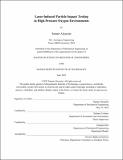Laser-Induced Particle Impact Testing in High-Pressure Oxygen Environments
Author(s)
Alyassini, Samair
DownloadThesis PDF (7.590Mb)
Advisor
Cordero, Zachary
Terms of use
Metadata
Show full item recordAbstract
Particle impact ignition is an important source of metal fires in the high-pressure oxygen environments found in the turbines of oxygen-rich turbopumps. Understanding of particle impact ignition has been hindered by experimental challenges in reproducing this phenomenon under controlled laboratory conditions. This study addresses these challenges through the development of a specialized particle impact rig that integrates laser-induced particle impact testing (LIPIT) into an oxygen-compatible pressure vessel, thus enabling precise control over environmental conditions (target temperature, oxygen pressure) as well as impact variables (particle size/shape, impact velocity). This thesis describes the design of the oxygen-compatible pressure vessel, emphasizing considerations such as stress analysis, materials selection, oxygen-compatibility, and integration with the LIPIT system. The thesis concludes with pathfinding experiments successfully demonstrating particle ignition in a prototype rig, providing in situ images of single particle ignition events using application-relevant materials and particle sizes. Future work will use this rig to characterize the effects of operating conditions and material choices on susceptibility to particle impact ignition with a view toward developing more durable oxygen-compatible hardware for next-generation staged combustion rocket engines.
Date issued
2023-06Department
Massachusetts Institute of Technology. Department of Mechanical EngineeringPublisher
Massachusetts Institute of Technology